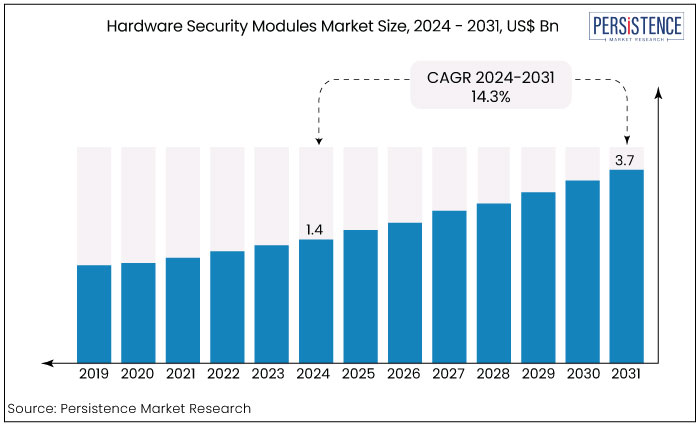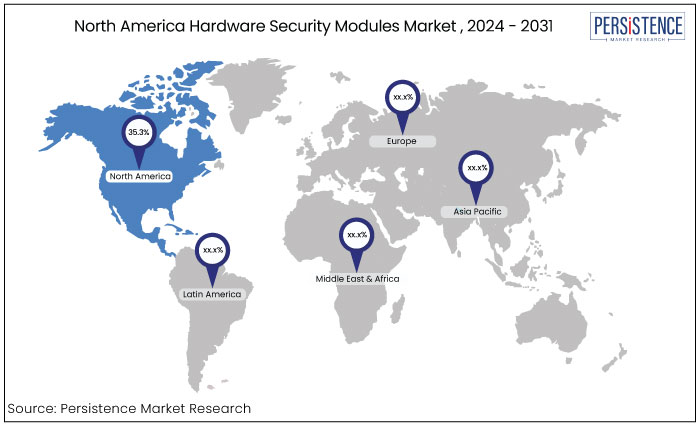Hardware Security Modules Market
Industry: IT and Telecommunication
Published Date: September-2024
Format: PPT*, PDF, EXCEL
Delivery Timelines: Contact Sales
Number of Pages: 155
Report ID: PMRREP34792
The hardware security modules (HSM) market is estimated to increase from US$1.4 Bn in 2024 to US$3.7 Bn in 2031. The market is estimated to record a CAGR of 14.3% during the forecast period from 2024 to 2031. This market growth is attributed to the rise in digital transactions, portability, and robust security features. The market is also driven by the demand for data security solutions and stringent regulatory frameworks.

Key Highlights of the Market
|
Attributes |
Key Insights |
|
Market Size (2024E) |
US$1.4 Bn |
|
Projected Market Value (2031F) |
US$3.7 Bn |
|
Global Market Growth Rate (CAGR 2024 to 2031) |
14.3% |
|
Historical Market Growth Rate (CAGR 2019 to 2023) |
10.7% |
|
Region |
Market Share in 2024 |
|
North America |
35.3%; |
North America hardware security modules market to command a significant share of over 35.3% in 2024. This growth is fueled by the region's unwavering commitment to cybersecurity and the enforcement of rigorous regulatory standards.
As organizations increasingly adopt advanced technologies such as cloud computing, the Internet of Things (IoT), and digital payment systems, the need for robust security measures intensifies driving the demand for HSMs.
Strong presence of leading market players coupled with considerable investments in research and development plays a crucial role in propelling the expansion of the HSM market across North America.

|
Region |
CAGR through 2031 |
|
Europe |
14.3% |
The hardware security modules market in Europe is poised for significant growth projected to expand at a CAGR 14.3% during the forecast period from 2024 to 2031. This upward trend is largely driven by the region's stringent data protection laws and rigorous security compliance requirements.
The General Data Protection Regulation (GDPR) plays a pivotal role in accelerating HSM adoption as organizations work diligently to ensure data protection and adhere to regulatory mandates. Additionally, the increasing emphasis on securing digital transactions along with advancements in cloud computing and the Internet of Things (IoT) further bolsters the demand for HSMs across Europe.
|
Category |
Market Shares in 2023 |
|
Type - USB Based |
42.3% |
As per the hardware security modules market update in 2024, the USB based hardware security modules are poised to emerge as the largest contributor capturing over 42.3% of the total market share. The segment’s growth is largely attributed to the device's portability, straightforward deployment, and robust security features.
Both organizations and individual users prefer USB-based HSMs for their convenience and adaptability enabling secure cryptographic operations anytime and anywhere. These devices are especially beneficial for small to medium-sized enterprises and remote workers who need reliable access to sensitive data and cryptographic keys beyond conventional office settings.
The on-premises deployment segment is expected to lead the market in 2024 capturing the large market share. This trend is primarily driven by the growing necessity for stringent security measures, regulatory compliance, and data sovereignty.
Organizations handling sensitive information are increasingly opting for on premise HSMs as they allow for direct oversight of cryptographic keys and security protocols. This control not only aids in adhering to industry-specific regulations but also fortifies defenses against both internal and external threats.
The seamless integration of HSMs into existing IT infrastructures significantly enhances their attractiveness for businesses focused on safeguarding data security and integrity.
The hardware security modules market analysis shows that the industry is growing notably and is projected to expand at a healthy CAGR in several regions. Hardware security modules (HSMs) are dedicated devices designed to securely manage, store, and protect cryptographic keys and perform cryptographic operations.
HSMs are widely used across industries including finance, healthcare, and government, where the protection of sensitive information is paramount. The sector is witnessing significant growth driven by the rising demand for data security solutions in an increasingly digital world.
One of the primary hardware security modules market trends is the increasing adoption of cloud-based HSMs, as organizations seek scalable and flexible security solutions that can accommodate remote operations and cloud services.
The emergence of the IoT fuels the need for HSMs to secure connected devices and protect sensitive data transmitted over networks. Furthermore, regulatory compliance mandates such as GDPR and PCI DSS are compelling organizations to invest in robust security solutions, further propelling the HSM market.
The trend toward integrating AI and ML into HSMs is gaining momentum as these technologies can enhance threat detection and response capabilities. As cyber threats evolve, the demand for innovative and adaptive HSM solutions is expected to rise.
The hardware security modules market overview has shown healthy growth over the past several years, with a CAGR of 10.7% from 2019 to 2023. This growth can be attributed to the increasing need for secure data storage and management solutions across various sectors, particularly finance, healthcare, and government.
Organizations have become more aware of the potential risks associated with data breaches and cyberattacks. The rise in digital transactions and the proliferation of cloud computing have fueled the demand for HSMs as companies seek to enhance their security infrastructure.
The HSM market is poised for even more substantial growth with a projected CAGR of 14.3% from 2024 to 2031. This significant increase is expected to be driven by several hardware security modules market growth factors.
The digital transformation across industries will continue to necessitate secure data management and transaction processing environments. Expanding the Internet of Things (IoT) ecosystem will require robust security solutions to protect the multitude of connected devices, further fueling the demand for HSMs.
Technological advancements such as blockchain and artificial intelligence will create new opportunities for HSM applications particularly in securing digital identities and managing cryptographic keys. As organizations increasingly prioritize cybersecurity and data integrity, the HSM market is set to expand.
Increasing Cybersecurity Threats
The rise in cyberattacks and data breaches has become a significant driver for the hardware security modules market demand. Organizations are increasingly recognizing the need to protect sensitive information, such as personal data and financial transactions, from unauthorized access.
HSMs provide a robust solution by securely managing cryptographic keys and performing encryption operations enhancing data security. As cyber threats evolve and become more sophisticated, the demand for HSMs is expected to grow compelling businesses to invest in these specialized devices to safeguard their critical assets.
Rapid Expansion of Digital Transactions
The rapid expansion of digital transactions fueled by e-commerce and mobile payments is another key growth driver for the hardware security modules market expansion. As more consumers and businesses engage in online financial activities, the need for secure transaction processing has intensified.
HSMs play a pivotal role in this ecosystem by providing secure key management and encryption services that protect sensitive financial data during transactions. With the ongoing shift towards digital payment solutions, the demand for HSMs is expected to rise, further propelling market growth as organizations seek to enhance their security infrastructure.
Regulatory Compliance Requirements
The rise of stringent regulatory frameworks, such as GDPR, PCI DSS, and HIPAA, is a crucial driver pushing organizations toward comprehensive data protection measures. Compliance with these regulations often mandates using advanced security solutions including HSMs to ensure the secure handling of sensitive data.
As businesses strive to meet these legal obligations and avoid hefty fines, the adoption of HSMs is becoming increasingly prevalent. This trend is particularly pronounced in sectors like finance and healthcare, where data security is paramount driving hardware security modules market growth.
High Implementation Costs
One of the significant barriers for the hardware security modules market growth is the high cost associated with their implementation and maintenance. Organizations often face substantial upfront investments for purchasing HSM devices and ongoing expenses for integration, management, and compliance with regulatory standards.
Financial burden can deter small businesses or those with limited budgets from adopting HSM solutions leading to slow market penetration. As a result, the high costs may restrict the overall growth potential of the HSM market particularly in price-sensitive sectors.
Complexity of Integration.
The complexity involved in integrating HSMs into existing IT infrastructures poses another challenge for the hardware security modules market. Organizations often have diverse systems and applications that require seamless interoperability with HSMs complicating the deployment process.
The need for specialized knowledge and skills to manage and operate HSMs can further hinder adoption. This complexity may lead to longer implementation timelines and increased resource allocation, discouraging some organizations from pursuing HSM solutions. Therefore, the integration challenges can impede the overall growth of the HSM market as businesses weigh the benefits against the potential difficulties.
Cloud-Based HSM Solutions
As more organizations migrate their operations to the cloud, there is a significant opportunity for developing and adopting cloud-based hardware security modules (HSMs). These solutions offer scalable and flexible security options allowing businesses to manage cryptographic keys and secure data without requiring extensive on-premises infrastructure.
Cloud-based HSMs provide enhanced accessibility while ensuring compliance with security standards. This shift toward cloud adoption creates growing market for HSM providers and enables businesses to reduce costs and improve efficiency in their security strategies.
Integration with Emerging Technologies
Integrating hardware security modules with emerging technologies such as blockchain and the Internet of Things (IoT) presents several hardware security modules market opportunities for expansion. HSMs can enhance the security of blockchain applications by securely managing cryptographic keys and ensuring transaction integrity.
As IoT devices proliferate, HSMs can provide security measures to protect sensitive data transmitted between connected devices. By leveraging these emerging technologies, HSM providers can offer innovative solutions that address the evolving security needs of various industries driving future growth in the market.
The hardware security modules market is characterized by intense competition among key players striving to innovate and capture market share. Companies like Thales have made significant strides by integrating their HSM solutions into advanced applications like Thales HSM in Ericsson's 5G Core authentication solution in 2022. It enhances security in the evolving 5G ecosystem. This innovation reflects the industry's focus on improving security while addressing the complexities of modern digital transactions.
Recent Developments in the Hardware Security Modules Market
August 2024, Thales Trusted Cyber-Technologies has launched the Luna T-Series Tablet Hardware Security Module designed to protect data, applications, and cryptographic keys in an offline environment. The system operates through a host-powered USB port with an LCD status display. Thales also released the Luna T-Series HSM version 7.13.2, compliant with the Federal Information Processing Standard 140-3, and the Thales TCT T-Series Backup HSM.
July 2024, Google has launched a vulnerability reward program, kvmCTF, which offers rewards of up to $250,000 for full VM escape exploits. The program aims to improve the security of the Kernel-based Virtual Machine (KVM) hypervisor, a crucial component in both consumer and enterprise settings. KVM is an open-source hypervisor that powers Google Cloud and Android platforms.
|
Attributes |
Details |
|
Forecast Period |
2024 to 2031 |
|
Historical Data Available for |
2019 to 2023 |
|
Market Analysis |
US$ Billion for Value |
|
Key Regions Covered |
|
|
Key Market Segments Covered |
|
|
Key Companies Profiled |
|
|
Report Coverage |
|
|
Customization & Pricing |
Available upon request |
By Type
By Deployment
By Region
To know more about delivery timeline for this report Contact Sales

The market is predicted to rise from US$1.4 Bn in 2024 to US$3.7 Bn by 2031.
Some of the leading players operating in the market are Alfresco Software, Inc., Box, Inc., DocuWare Corporation, and Hyland Software.
The USB based hardware security modules are leading type in the market.
Europe is dominating the market exhibiting a CAGR of 14.3% through 2031.
Increasing emphasis on securing digital transactions is a key trend in the market.